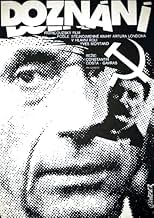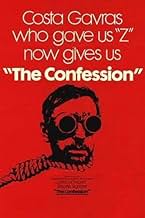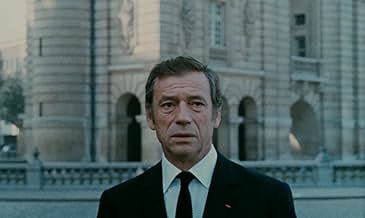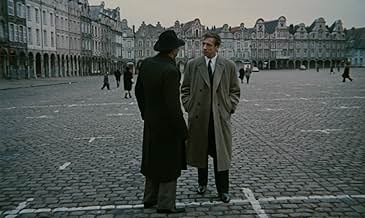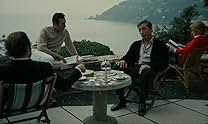IMDb रेटिंग
7.8/10
5.1 हज़ार
आपकी रेटिंग
अपनी भाषा में प्लॉट जोड़ेंA high-ranking official is forced to confess to high treason.A high-ranking official is forced to confess to high treason.A high-ranking official is forced to confess to high treason.
- 1 BAFTA अवार्ड के लिए नामांकित
- 3 जीत और कुल 3 नामांकन
फ़ीचर्ड समीक्षाएं
I'll start this review by saying that although I do consider Gavras to be a very good and skillful director, at the same moment I consider him overrated by many, at least according to the films I have seen of him (Z, Mad City and Amen). However, in this film he really left me at some moments breathless! The film is set in an unnamed communist state of Eastern Europe, a satellite of the USSR. The main character had recently reached the Supreme Council of the Party by being appointed Minister. He has a rich history behind him as a communist fighter and politician. However, one morning, some guys from the secret police arrest him (and others as we later find out), throw him in a cell, try to break his will and make him confess of his unloyalty to the Party, something that he never committed though. Of course it is the Soviets who demanded his imprisonment and confession and the puppet government has to oblige.
We had this film shown at the university here two weeks ago and I really couldn't understand why some guys found it "boring". It showed things that seem really barbarous to us now but they DID happen to MANY people back then. And many of them did not have the influence the character of this film had. I suppose the people who made this criticism judge a movie by how many explosions and cold jokes it has in it but that's not the point here. This movie HAD to have a slow pacing in order to show how hard it is for the days to pass in this madhouse-prison.
The acting is great, especially from Yves Montand and all those actors who play the crazy communist officials :p It's thrilling to see the character's facial expressions change throughout the film showing suspicion at first before he gets arrested... then shock... then despair... and then plain stubbornness and exhaustion. It's obvious that everyone took this film very seriously and thus the great performances! Another thing that surprised me and was also mentioned by the (unfortunately only) other reviewer of this film is that it was shot in 1971. This is noticeable on its own, because it was a time that not only the Soviet Union was still strong (with Brezniev trying to show a "nicer" but also stronger face to the world) but the Communist Party in France had also great support and numbers of voters. I would like to know more about how the French audience reacted when the film was screened for the first time back then...
Overall, it is a movie that I would recommend anyone watching. It is a good and graphic display of how far the demands of power can reach and the paranoid mentality of the Cold War (and it would be wise to remember that this mentality and these incidents did not only take place in the East side but in the West as well). If you find it on VHS (since I doubt that it is released on DVD) just grab it!
We had this film shown at the university here two weeks ago and I really couldn't understand why some guys found it "boring". It showed things that seem really barbarous to us now but they DID happen to MANY people back then. And many of them did not have the influence the character of this film had. I suppose the people who made this criticism judge a movie by how many explosions and cold jokes it has in it but that's not the point here. This movie HAD to have a slow pacing in order to show how hard it is for the days to pass in this madhouse-prison.
The acting is great, especially from Yves Montand and all those actors who play the crazy communist officials :p It's thrilling to see the character's facial expressions change throughout the film showing suspicion at first before he gets arrested... then shock... then despair... and then plain stubbornness and exhaustion. It's obvious that everyone took this film very seriously and thus the great performances! Another thing that surprised me and was also mentioned by the (unfortunately only) other reviewer of this film is that it was shot in 1971. This is noticeable on its own, because it was a time that not only the Soviet Union was still strong (with Brezniev trying to show a "nicer" but also stronger face to the world) but the Communist Party in France had also great support and numbers of voters. I would like to know more about how the French audience reacted when the film was screened for the first time back then...
Overall, it is a movie that I would recommend anyone watching. It is a good and graphic display of how far the demands of power can reach and the paranoid mentality of the Cold War (and it would be wise to remember that this mentality and these incidents did not only take place in the East side but in the West as well). If you find it on VHS (since I doubt that it is released on DVD) just grab it!
The split between Tito and Stalin (1948), in the late 1940s and early 1950s, was followed by show trials of prominent Communists all over Eastern Europe and the wave of Stalinist purges in which tens of thousands suffered or lost their lives. This movie is about the 1952 process in Prague, conducted against Rudolf Slánský and 13 other leading members of the Communist Party of Czechoslovakia (KSC). The main protagonist - Anton Ludvik, aka Gerard, is based on Arthur London, veteran of the Spanish Civil War and the French resistance movement, who, at the time of the arrest, was vice-minister of Foreign Affairs of Czechoslovakia and a senior official of KSC. Display of Stalinist torture and interrogation process in preparation for rigged political trial is very realistic. Based on actual events.
Anton Ludvik, aka Gerard, is vice-minister of Foreign Affairs of Czechoslovakia. He realizes he is watched and followed. One day, he is arrested and put into jail, in solitary confinement. Will be shown the mental tortures during the investigations and how a faithful top-ranking civil servant is made to confess to treason.
A French political thriller based on a real story in Czechoslovakia? Wow! This actually makes a lot of sense. The Czech people do not have many stories told about them, but they do happen to live in an unfortunate area, sandwiched between Germany and Russia. And, as we know, throughout the 20th Century, those two nations liked to assert their influence on the neighbors.
It is so great to see the story here of a man who stood against the Nazis now having to fight back against the politicians he helped support (sort of).
A French political thriller based on a real story in Czechoslovakia? Wow! This actually makes a lot of sense. The Czech people do not have many stories told about them, but they do happen to live in an unfortunate area, sandwiched between Germany and Russia. And, as we know, throughout the 20th Century, those two nations liked to assert their influence on the neighbors.
It is so great to see the story here of a man who stood against the Nazis now having to fight back against the politicians he helped support (sort of).
Anton Ludvik aka Gerard (Yves Montand) is the vice-minister of Foreign Affairs of Czechoslovakia. He is worried that he's being followed. Other officials are being picked up in a purge. He gets picked up by a dark militaristic organization. His family is harassed. His wife Londonova (Simone Signoret) struggles in her new circumstances. He is psychologically tortured to give false confessions.
This is basically two hours of movie confinement with his jailers doing all kinds of psychological warfare. At times, I feel like being tortured myself. There's good and bad in that. It doesn't make for a pleasant or necessarily a compelling viewing experience. It's more of a compelling academic exercise. This is the cinematic equivalent of stress position. The acting is impeccable and the production is first rate. It's Kafkaesque and a cry against totalitarianism.
This is basically two hours of movie confinement with his jailers doing all kinds of psychological warfare. At times, I feel like being tortured myself. There's good and bad in that. It doesn't make for a pleasant or necessarily a compelling viewing experience. It's more of a compelling academic exercise. This is the cinematic equivalent of stress position. The acting is impeccable and the production is first rate. It's Kafkaesque and a cry against totalitarianism.
I saw it as a Eastern viewer, knowing , directly, few crumbs of the last decade of Ceausescu regime. I saw it, too, as History teacher. And as one of familiars with the universe of Costa Gavras cinematographic work. It is a pure masterpiece , first for the high dose of truth. Second, for acting. Not the last, for the final part . In essence a try of exorcism. Brutal, honest, precise. Maybe useful.
क्या आपको पता है
- ट्रिवियाThe film was restored in 2014 by KG Productions with the support of the CNC under the supervision of Costa-Gavras by Éclair Group for the image and L.E. Diapason for the sound.
- कनेक्शनEdited into Le tombeau d'Alexandre (1993)
- साउंडट्रैकL'Aveu (Générique)
Written by Giovanni Fusco
टॉप पसंद
रेटिंग देने के लिए साइन-इन करें और वैयक्तिकृत सुझावों के लिए वॉचलिस्ट करें
- How long is The Confession?Alexa द्वारा संचालित
विवरण
- रिलीज़ की तारीख़
- कंट्री ऑफ़ ओरिजिन
- भाषाएं
- इस रूप में भी जाना जाता है
- The Confession
- फ़िल्माने की जगहें
- Grand Place, Arras, Pas-de-Calais, फ़्रांस(London seeing Kahoutek for the last time)
- उत्पादन कंपनियां
- IMDbPro पर और कंपनी क्रेडिट देखें
बॉक्स ऑफ़िस
- US और कनाडा में सकल
- $3,29,954
इस पेज में योगदान दें
किसी बदलाव का सुझाव दें या अनुपलब्ध कॉन्टेंट जोड़ें

